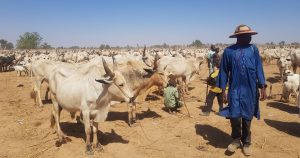FEATURES
Buhari Writes Nigerians on COVID-19

Over the last few days I have received extensive briefings on the state of the nation as it relates to the Covid-19 pandemic, from the relevant Federal Government agencies as well as the Lagos State Government.
Accordingly, I approved the following:
The immediate release of a 10 billion Naira grant to Lagos State, which remains the epicentre of the Covid-19 outbreak in Nigeria.
This grant will enable Lagos State increase its capacity to control and contain the outbreak, while also supporting other States with capacity building.The immediate release of a 5 billion Naira special intervention fund to the Nigeria Center for Disease Control (NCDC) to equip, expand and provide personnel to its facilities and laboratories across the country.
The Nigerian Air Force is already making its fleet available to the Presidential Task Force on Covid-19, to enable a better coordinated and more effective response across the country.
To protect our homeland from external exposure, I directed the immediate closure of our International Airports and Land Borders for four weeks in the first instance, to enable us put up the appropriate policies, processes and infrastructure to cope with suspected and confirmed cases at home, without risking a compounding of the situation with more imported cases.
The inconvenience caused by these flight and travel restrictions to our fellow citizens abroad who want to return home is regrettable, but it is necessary for the greater good, and I thank you all for your understanding and cooperation.
I have also directed that only cargo vessels that have been at sea for more than 14 days be allowed to dock in our ports, after the crew have been tested and confirmed disease-free by the Port Health Authorities. This 14-day restriction however does not apply to vessels carrying oil and gas products as by their nature, there is minimal human contact.
We have also suspended the movement of commuter trains to limit the spread of the virus to other parts of the country.
I have directed the NCDC to draft all its recent retirees back into service to beef up our manpower as we respond to the pandemic.
Furthermore, all NCDC staff and experts who are away on training or international assignments are to return immediately. Already the Nigerian Air Force (NAF) are conducting an evacuation mission to bring back some of our specialists in Central Africa, to enable them support the national response.
I commend the monetary policy authorities for their financial intervention to support our entrepreneurs and companies as we go through this difficult time. We are also looking at fiscal measures to minimise the negative impact of this pandemic on the livelihood of millions of Nigerians.
As you are aware we have begun the process of reviewing the federal budget. We shall communicate our fiscal interventions once the budget review process is concluded.
In the meantime, I have directed the Minister of Industry, Trade and Investment, to work with the Manufacturers Association of Nigeria, to ensure that all production of essential items such as food, medical and pharmaceutical products continues unhindered.
We are engaging our international friends and partners to share knowledge and to seek their support in our response to the pandemic. We are grateful for the show of support thus far – we have already started receiving goods and supplies intended to help us scale up our efforts.
Let me specially thank and commend all of the hard and heroic work being done by our medical personnel, the NCDC, Port Health Authorities, Security Agencies, State Governments, and all ad-hoc staff and volunteers.
I urge all Nigerians to be mindful of those among us who seek to spread panic and misinformation, and sow confusion at this time. We must all pay attention only to the relevant government agencies working day and night to make accurate and useful information available to the public.
I will also ask all of us to strictly obey all public health guidelines and instructions issued by the Federal and State health authorities, regarding personal hygiene and social distancing. These guidelines will be updated from time to time as new information and treatments are obtained.
In the meantime, I want to assure all Nigerians, that the Federal Government remains committed to protecting all Nigerians. We seek your full support and cooperation as we go through this very difficult time. Together we will triumph over this pandemic.
*President Muhammadu Buhari*
26/03/2020
FEATURES
Nigeria’s Fight To Eliminate Hepatitis In Prisons
By Rachea Abuja
In Nigeria, estimates from the National AIDS, STIs and Hepatitis Control Programme (NASCP) show that 8.1 per cent of adults aged 15–64 live with hepatitis B, and 1.1 per cent with hepatitis C.On a worrisome note, more than 80 per cent of those infected are unaware of their status, enabling the virus to spread silently, in homes, hospitals, and correctional facilities.
Public health experts say correctional centres are among the highest-risk environments for viral hepatitis due to overcrowding, unsafe medical practices, limited access to testing, and stigma. According to the World Health Organisation (WHO), viral hepatitis, particularly types B and C, is a global public health threat that kills approximately 1.3 million people each year, making it second only to tuberculosis among infectious diseases.In spite of its deadly toll, hepatitis is often overlooked, especially in low- and middle-income countries like Nigeria.More than 91 million people in the WHO African region live with hepatitis B or C, representing 26 per cent of the global burden.Shared razor blades, contaminated injection equipment, and poor sanitation all contribute to the spread.When 34-year-old Malam Musa Danladi was arrested, tried and sentenced in 2022, he knew prison would be tough; but what he did not expect was that a place of punishment would become a place of diagnosis, for a disease he had never heard of.“They called me to the clinic one morning; I was confused; the nurse said I had hepatitis B; I did not even know what that meant.”He is one of thousands of Nigerians living with viral hepatitis, a disease that often shows no symptoms until it causes irreversible damage to the liver.Danladi is also among the few who discovered their status within prison walls.“We used to share everything, razors, clippers, even toothbrushes; Nobody told us we were at risk.“Incarcerated people face a triple burden: poverty, stigma, and disease, with few resources or pathways to care,” Danladi said.In a bid to reverse this trend, the Nigerian government, in July, unveiled Project 365, a year-long national campaign to test, treat, and vaccinate millions of Nigerians for hepatitis, including those in prison settings.The unveiling coincided with World Hepatitis Day, with the theme: “Hepatitis Can’t Wait- Test. Treat. Eliminate.”According to Prof. Muhammad Ali Pate, Coordinating Minister of Health and Social Welfare, Nigeria is losing between ₦10.3 trillion and ₦17.9 trillion annually to hepatitis-related productivity and healthcare costs.“Project 365 is about saving lives and saving our economy,” he said.Pate said that the project 365 aimed to screen every federal constituency in Nigeria, totaling 360, and to deliver curative treatment for hepatitis C as well as vaccination for hepatitis B.He said it also sought to expand outreach to prisons, internally displaced persons (IDP) camps, rural communities, and other underserved regions.The minister said it would ensure sustainable financing for testing and treatment, and the initiative established the Viral Elimination Fund (VEL).Additionally, he said that the project 365 would promote local production of hepatitis diagnostics and medications, supported by tax incentives and regulatory reforms, to reduce reliance on imports.At Kuje Medium Security Custodial Centre, a pilot hepatitis programme under the Viral Hepatitis Action in Correctional Services screened 830 inmates between December 2024 and June 2025.Dr Ibrahim Ehizogie, a clinician with the Nigerian Correctional Services, said that many inmates were already infected with the disease while in custody.Ehizogie said that the programme was now being scaled across Nigeria’s six geopolitical zones, with a target to reach all 300 custodial centres in the country.However, experts warn that without continued funding, education, and policy enforcement, these gains may be short-lived.According the 2024 INHSU Global Guideline on the Elimination of Hepatitis C in Prisons, incarcerated individuals have the same right to healthcare as the general population, and that denying hepatitis services in custody violates international human rights standards.The guideline recommends that inmates should be tested and initiated on treatment within seven days of incarceration.It also emphasises the integration of harm reduction services, such as safe injection practices and opioid substitution therapy, to reduce transmission.Furthermore, the guideline advocates for peer-led education and community-based screening models to increase uptake and reduce stigma, and stress the importance of ensuring continuity of care upon release, so that individuals can maintain their treatment and health outside prison walls.Dr Mya Ngon, WHO Team Lead for Communicable and Non-Communicable Diseases, commended Nigeria’s efforts.Ngon said that screening must be linked to treatment, and treatment must be linked to continuity of care, even after prison.Since his release, Daladi has become a community advocate, telling others about hepatitis, its transmission, and the importance of testing.“I did not die in prison; so, I want to use my voice; people need to know it is not a death sentence; you can treat it; you can live; but stigma remains.“Some people say I brought prison sickness home; some would not even shake my hand,” he said.According to him, at present, he works in his community to support reintegration and health education, urged the government to expand outreach to ex-inmates and low-income communities.In spite of the progress of Project 365, experts identify critical gaps in Nigeria’s hepatitis response; they say female inmates and pregnant women in custody are often excluded from routine hepatitis screening, leaving a critical gap in care.Prof Taiwo Lateef, Professor at ABU and Africa Lead for Lifeline International, said that harm reduction services, such as access to sterile injecting equipment or safe drug treatment options, were largely absent in correctional centres.In many cases, Lateef noted that the continuity of treatment after release remained uncertain, making long-term management of the disease difficult.He said that youth offenders and first-time detainees typically received little to no education on hepatitis prevention, increasing their vulnerability.Lateef said that Nigeria did not have a national hepatitis registry for prisons, making it challenging to track disease prevalence, monitor treatment coverage, or evaluate outcomes in custodial settings.Dr Adebola Bashorun, National Coordinator for NASCP, said that without structured data and legal protections, prison health reform would remain incomplete.Bashorun said that Nigeria’s hepatitis elimination strategy was ambitious and commendable.He said that success would require multisectoral partnerships, political will, and a people-first approach.According to, Dr Titilola Munkail, Technical Officer at Africa CDC, one cannot talk about ending hepatitis if one ignores people behind bars.Munkail said that prisons were not separate from public health.“They are central to it,” he said.As Nigeria races toward the 2030 elimination goal, stakeholders urge the government, civil society, and citizens to act.They say there is need for the government to institutionalise hepatitis services in all correctional facilities and primary healthcare centres (PHCs) to ensure consistent and equitable access to care. (NANFeatures)FEATURES
Embracing Holistic Care in Sickle Cell Disease Management: A New Dawn of Hope for Warriors

By Obi Light Ogbonnia
Sickle Cell Disease (SCD), a hereditary blood disorder affecting millions worldwide, is especially prevalent in Nigeria, where over 150,000 children are born with the condition annually. Many do not live past the age of five due to poor access to quality healthcare, lack of awareness, and stigmatization.
For those who survive, the journey is often one of pain, crisis, and repeated hospitalization.While medical science continues to make commendable strides through bone marrow transplants, hydroxyurea, and advanced diagnostics, it is clear that clinical solutions alone are not enough. A comprehensive, holistic care model is urgently needed, one that views the patient not just as a set of symptoms, but as a whole person deserving of dignity, compassion, and support.
What is Holistic Care in SCD?
Holistic care is a patient-centered approach that addresses the physical, emotional, psychological, spiritual, nutritional, and social aspects of life. In the context of sickle cell disease, this means going beyond medications and crises to provide wraparound care that sustains both body and spirit.
Key components include: Effective pain management (both medical and non-pharmacological), Mental health support (counseling, therapy, peer support), Nutrition and hydration guidance, Faith-based and spiritual care, Family and caregiver education, Community awareness and social empowerment and Managing Pain Beyond the Hospital Bed
For many warriors, pain crises are the most debilitating part of SCD. While analgesics and opioids are standard treatments, integrating heat therapy, meditation, music, art therapy, massage, and breathing exercises can significantly reduce frequency and severity of pain episodes. These methods also help reduce emotional trauma and dependence on medication.
Mental and Emotional Health: The Invisible Crisis
The psychological impact of SCD, especially depression, anxiety, and social isolation, is often ignored. Many warriors, especially adolescents, suffer in silence. Incorporating professional counseling and trauma-informed therapy within SCD clinics can make a life-saving difference.
Support groups, storytelling platforms, and psychosocial interventions can empower warriors to share, heal, and thrive.
Food, Faith, and Lifestyle
Good nutrition is not a luxury for warriors, it is essential. Diets rich in folate, vitamins, fruits, vegetables, and adequate hydration help in blood formation and crisis prevention. Alongside this, moderate exercise, adequate rest, and temperature regulation are vital.
For many, faith remains an anchor. Whether through prayer, pastoral care, or spiritual counseling, holistic care honors the emotional strength that comes from belief and community.
Families: The First Line of Care
No warrior walks alone. Family members—especially mothers—often carry the burden of care without support or training. We must empower caregivers with knowledge, resources, and rest. Providing community-based education programs, crisis response training, and emotional support for caregivers is a cornerstone of holistic health.
A Call to Action for Policymakers and Society
Holistic care must become part of national policy. We urge the Nigerian government and health institutions to:
Invest in multidisciplinary SCD care centers
Train and employ social workers, psychologists, nutritionists, and pastoral caregivers
Include mental health and alternative therapies in national health insurance coverage
Fund grassroots awareness and education campaigns
Conclusion: From Surviving to Thriving
As a 51-year-old sickle cell warrior myself, I speak from lived experience: sickle cell disorder does not define us. With the right support, we can live full, joyful, productive lives. Holistic care is not an ideal—it is an urgent necessity.
The Obi Ogbonnia Sickle Cell Foundation was born from this conviction—to raise awareness, provide support, and advocate for those who cannot fight alone. We invite governments, NGOs, faith-based organizations, and individuals to partner with us in this mission.
Let us not allow another warrior to perish due to lack of compassion, knowledge, or access. Let us create a new future—where every sickle cell warrior lives with dignity, wellness, and hope.
Obi Light Ogbonnia is the Founder, Obi Ogbonnia Sickle Cell Foundation, info@ooscf.com, +2348057157133, www.ooscf.org.ng
FEATURES
When Will The Road Killings Stop?

By Sale Rusulana Yanguruza
Nigeria has today counted and witnessed multiple killings of innocent people and bombings of citizens on the roads from different angles in the South and some Northern parts of Nigeria. Unfortunately, none of the perpetrators have been brought to face the wrath of the law.
In less than two months, 16 hunters were killed by mob youth in Uromi, Enugu State, and the details about those arrested and suspects are still undisclosed to the members of the public.
Their families and the Hausa people are mourning the death of these innocent individuals who were brutally killed, but the silence of the government is devastating. Even the compensation that Governor Abba Kabir Yusuf promised and requested from the Edo State government is still unclear to the members of the public.The most devastating aspect of the road killings is that most of the victims are Hausa or Muslim, simply because they are from the North. How can traveling on the roads be a reason to kill a citizens? Why are Hausa and Muslim individuals always the victims ? Is it only hausa people traveling by the road in Nigeria?
Even though the answers that these youths usually give is that Fulani and terrorists are killing them overnight, that is not a reason to block roads and kill innocent people. They should know that Zamfara, Katsina, Kaduna, Niger, and Borno States are facing insecurity challenges like kidnapping, Boko Haram and Fulani clashes for over a decade, but none of the people from these states view a particular tribe or religion as the cause and use roads to kill innocent people.This act should be stop!
No doubt, Constitutionally, every individual in this country is entitled to move anywhere and leave wherever he/she wish to leave but unfortunately for Hausa and some Muslim individuals, traveling by road seems to be considered a sin by some youth, leading to serious punishment, which is barbaric killings by their so-called fellow citizens who do not have emotional feel for human being and their compatriots citizens .
I believe that in Nigeria, no tribe is exempt from traveling from one place to another. However, it’s saddening and regrettable that the Hausa people are disproportionately affected and become victims of road killings, and the government is still yet to take necessary actions to deal with such inhumane and unfathomable actions carried out by some groups.
The most terrible and gruesome aspect of such acts is that every day, the situation rises to an unbearable and unacceptable level. It’s imperative and necessary for the government to end these ongoing road killings before it will escalate to an uncontrollable level.
The government shouldn’t limit its activities to only condemning and sending condolence messages to the families victims of these inhumane and unfathomable killing of innocent people; actions must be taken, and the punishment of those involved in such road killings must be brought to public eyes.
No doubt, swift punishment would aid in reducing these ethno-religious killings in the country and would serve as a reference and warning to such mob groups that the government is prioritizing and exercising its constitutional duties as a government in protecting the lives of its citizens who are brutally killed and burned.
Doubtless, Most of the victims are from Kano State, where the majority of travelers from all 36 states enter the state everyday to carry out their business activities, considering the state as a center of commerce. Still, none of the travelers from other ethnic groups were killed and burnt in Kano. Why do some groups choose to reward these people with the killings of their own brothers and sisters ?
It’s very alarming to note the numbers of Northerners killed simply because they’re traveling is rising every month, with no concrete reasons to justify their offenses, but merely due to their identity as Northern Muslims or Hausa by tribe. Additionally, Truck drivers have continuously faced these killings over the past eight years, yet no actions have been taken to avert further escalation and end it permanently.
In one editorial written by a popular newspaper in Nigeria, it’s reported that over 50 drivers have been killed and even burned their goods with some still missing due to this animalistic attitude of road killings. In May 2022, a pregnant woman, Harira Jubril, 32, and her four children were killed in the Orumba South Local Government Area of Anambra State. Even those who committed this act haven’t faced the wrath of the law.
One may ask: Is the government truly ready to end these barbaric killings that keep surging towards a particular or specific religion or tribe? Regrettably, in 2023, a group of mob killed about 20 people who were going for religious activities. All of them are Muslims. But who are the suspects, where are they, and what actions has the government taken on the perpetrators?
The people who killed those going to Maulud are the same people who recently killed those going for a wedding in a University Bus carrying the name of Ahmadu Bello University Zaria written in bold with a plate number to stop them and killed and burnt the car . What offense do they commit? How can a University bus carry terrorists and travel on the roads? The most disheartening aspect of these barbaric and animalistic acts is that they’re killing and burning people and still celebrating the deaths of these individuals; taking video footage-How heartless!
Do you think the government punishes those who killed the people going for Maulud, the Uromi 16, Harira Jubril and her four children, in public? The mob group would never dare attempt to do it again, sadly what is happening now is worrisome because the inactions is making the situation to take another dimension.They may believe that since several incidents, no actions have been taken to punish and bring them to book publicly, so it’s okay to repeat it again.May be it’s for this reason, recently, some of the mob group from Benue state killed Jamilu Ahmad and Barhama Suleiman who are from Kano State just in less than a week plateau group killed 13 and injured others.
Advisedly, the government and stakeholders must come up with security strategies and measures that will bring an end to these road killings. This can be achieved by updating the public about those arrested and who committed this animalistic act, to bring them to book and let the world know they have been punished.It’s notable that they celebrate the killing of people, take videos, and share them publicly, showcasing what they’ve done. If they can confidently act in such a manner, why is the government not updating the public about what happened to them after they’ve been arrested and taken to court?
| ReplyReply allForwardAdd reaction |




















